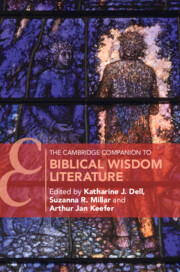Book contents
- The Cambridge Companion to Biblical Wisdom Literature
- Cambridge Companions to Religion
- The Cambridge Companion to Biblical Wisdom Literature
- Copyright page
- Contents
- Contributors
- Acknowledgement
- Abbreviations
- Part I The Context of Wisdom Literature
- Part II Wisdom Literature in the Hebrew Bible
- Part III Wisdom Literature beyond the Hebrew Bible
- 14 Ben Sira
- 15 The Book of Wisdom
- 16 Wisdom at Qumran
- 17 Egyptian Wisdom
- 18 The Syro-Palestinian Wisdom of the Late Bronze Age
- 19 Mesopotamian Wisdom
- Part IV Themes in the Wisdom Literature
- Bibliography
- Index
- Cambridge Companions to Religion
- References
19 - Mesopotamian Wisdom
from Part III - Wisdom Literature beyond the Hebrew Bible
Published online by Cambridge University Press: 28 July 2022
- The Cambridge Companion to Biblical Wisdom Literature
- Cambridge Companions to Religion
- The Cambridge Companion to Biblical Wisdom Literature
- Copyright page
- Contents
- Contributors
- Acknowledgement
- Abbreviations
- Part I The Context of Wisdom Literature
- Part II Wisdom Literature in the Hebrew Bible
- Part III Wisdom Literature beyond the Hebrew Bible
- 14 Ben Sira
- 15 The Book of Wisdom
- 16 Wisdom at Qumran
- 17 Egyptian Wisdom
- 18 The Syro-Palestinian Wisdom of the Late Bronze Age
- 19 Mesopotamian Wisdom
- Part IV Themes in the Wisdom Literature
- Bibliography
- Index
- Cambridge Companions to Religion
- References
Summary
Paul-Alain Beaulieu examines Mesopotamian Wisdom. While acknowledging that there is no native category of ‘Wisdom Literature’ in Mesopotamia, Beaulieu nonetheless finds it a helpful classification. Within this category are texts of several genres: we find disputations, which begin with a mythological introduction, progress to a verbal contest between non-human combatants, and conclude with the victor pronounced by a god. There are proverbs, found in collections and quoted in letters, as well as fables, often about animals. Instructions and admonitions transmit antediluvian wisdom to postdiluvian generations. Some texts reflect on the problem of theodicy, ruminating on the human-divine relationship and individual divine retribution, while others lament the futility of life and advocate a carpe diem attitude. School debates centralise learning and the scribal arts. These texts are linked by intertextual references and shared features, such as their frequent ascription to individual wise figures, assumption of the absolute and inscrutable power of the gods, and reflection on the human predicament.
- Type
- Chapter
- Information
- The Cambridge Companion to Biblical Wisdom Literature , pp. 366 - 388Publisher: Cambridge University PressPrint publication year: 2022

